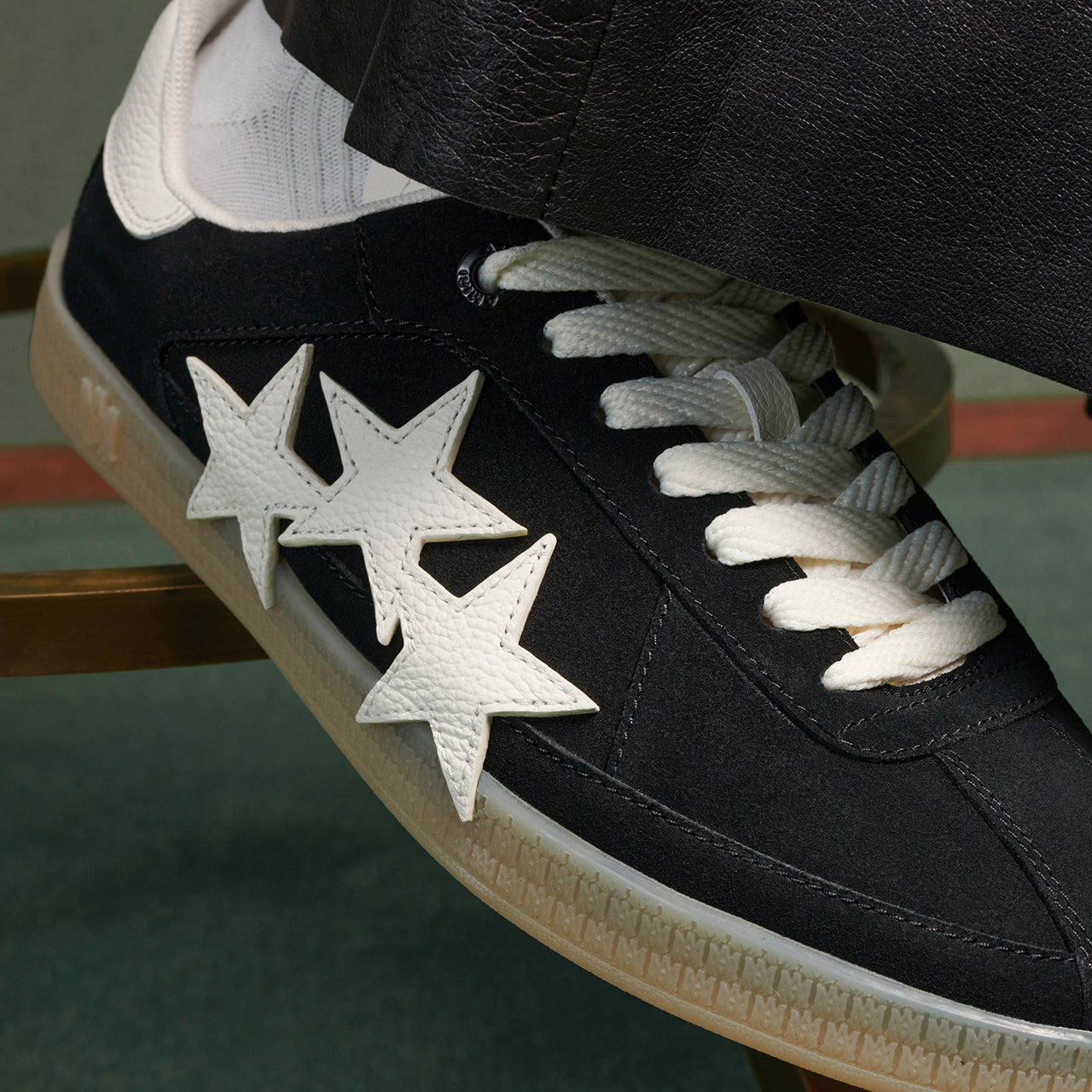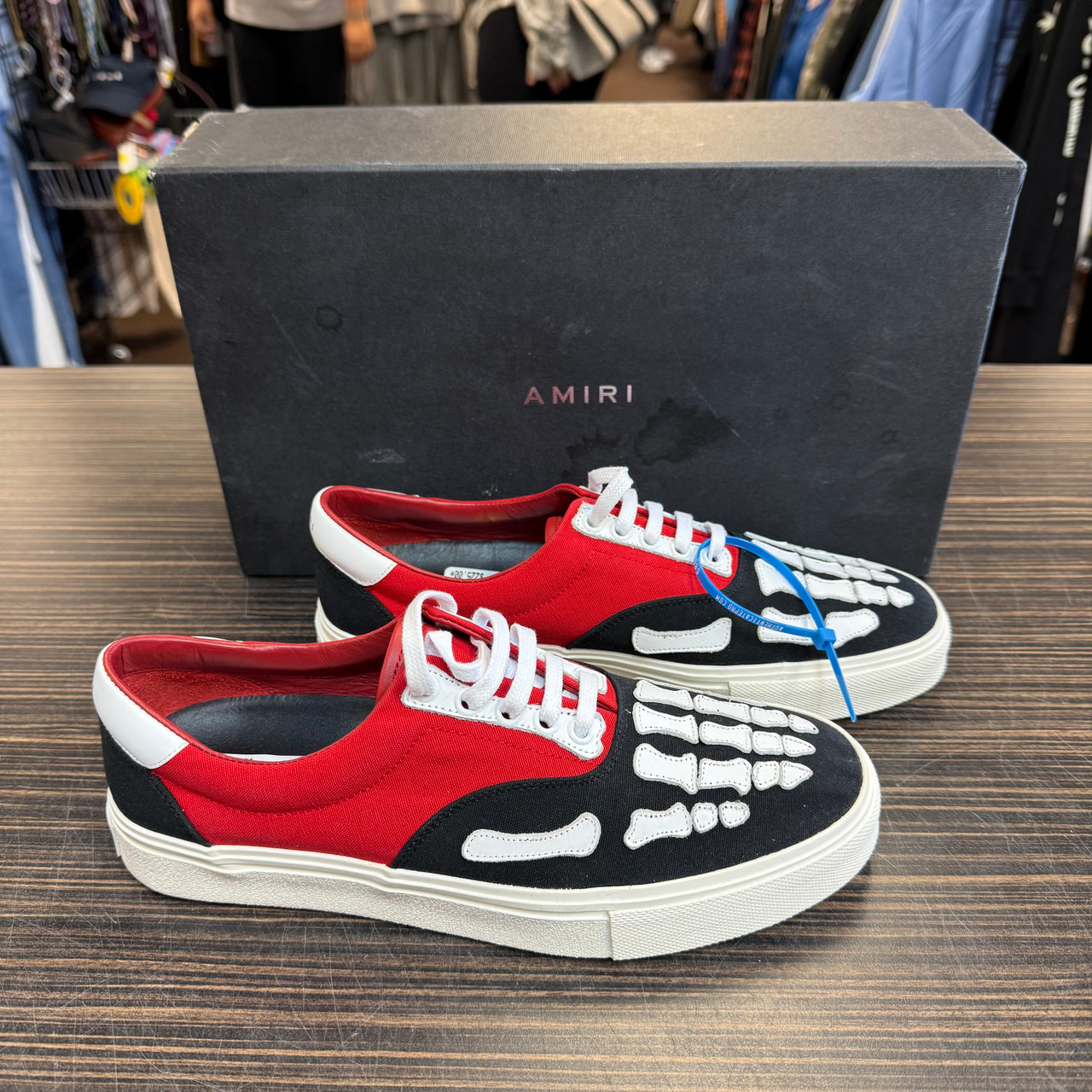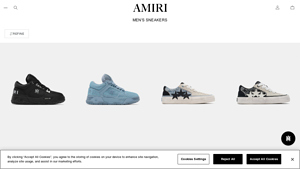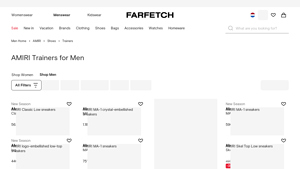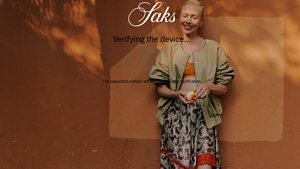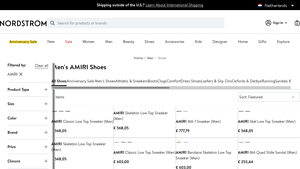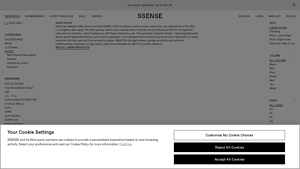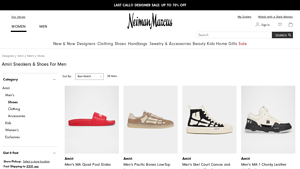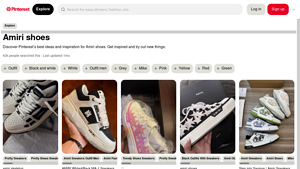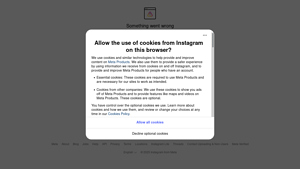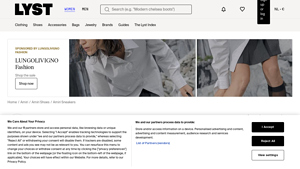Amiri Shoe Guide: Type,Cost,Material…
Introduction: Navigating the Global Market for amiri shoe
In today’s competitive landscape, sourcing high-quality Amiri shoes that resonate with brand identity and consumer preferences poses a significant challenge for international B2B buyers. With the rise of streetwear and luxury fashion, understanding the nuances of the Amiri brand—known for its unique blend of Los Angeles skate culture and high-fashion aesthetics—is crucial. This guide offers a comprehensive overview of the Amiri shoe market, including various styles, applications, supplier vetting processes, and pricing strategies.
By delving into the intricate details of Amiri shoes, this resource empowers B2B buyers from diverse regions, including Africa, South America, the Middle East, and Europe—such as Nigeria and Saudi Arabia—to make informed purchasing decisions. Buyers will gain insights into identifying reputable suppliers, understanding market trends, and assessing the overall value of Amiri footwear. The guide not only equips buyers with the knowledge to navigate the complexities of sourcing but also highlights the importance of aligning product offerings with consumer expectations.
Ultimately, this guide serves as a vital tool for international buyers looking to enhance their footwear collections with distinctive Amiri designs, ensuring they stay ahead in a rapidly evolving market.
Understanding amiri shoe Types and Variations
| Type Name | Key Distinguishing Features | Primary B2B Applications | Brief Pros & Cons for Buyers |
|---|---|---|---|
| Skel Sneakers | High-top and low-top designs with skeleton motifs | Streetwear retailers, fashion boutiques | Pros: Trendy appeal, unique designs. Cons: Higher price point may limit customer base. |
| MA-1 Sneakers | Chunky sole, premium leather, often with mesh | High-end sneaker shops, luxury retailers | Pros: Durable and stylish, versatile. Cons: May require higher investment upfront. |
| Pacific Low-Top Sneakers | Suede and leather options, sleek low-top silhouette | Casual footwear outlets, online stores | Pros: Comfortable and stylish, easy to pair. Cons: Limited seasonal demand. |
| Court Sneakers | Bandana prints, court-inspired designs | Sportswear retailers, sneaker enthusiasts | Pros: Sporty aesthetic, appeals to diverse age groups. Cons: May compete with established brands. |
| Slides & Sandals | Casual styles, often with logo embellishments | Summer footwear collections, resort shops | Pros: Easy to wear, great for warm climates. Cons: Seasonal sales fluctuations. |
What are the Key Characteristics of Skel Sneakers?
Skel Sneakers are known for their distinctive high-top and low-top designs adorned with skeleton motifs, reflecting a unique blend of streetwear and luxury. These sneakers often feature bold color contrasts and premium materials, making them highly sought after in the fashion-forward market. B2B buyers should consider their appeal to younger demographics and streetwear enthusiasts, as they can drive sales in fashion boutiques and specialty stores.
Why Choose MA-1 Sneakers for Your Retail Collection?
MA-1 Sneakers are characterized by their chunky soles and a mix of leather and mesh materials, offering both durability and a modern aesthetic. They are ideal for high-end sneaker shops and luxury retailers looking to attract customers seeking quality and style. When purchasing, B2B buyers should evaluate the investment required, as these sneakers often come with a higher price tag, but their versatility can justify the cost.
How Do Pacific Low-Top Sneakers Fit into the Market?
Pacific Low-Top Sneakers combine suede and leather for a sleek, minimalist look. Their design makes them suitable for casual footwear outlets and online stores aiming to cater to a broad audience. B2B buyers should consider the comfort factor, as these sneakers are popular for everyday wear. However, they may experience limited demand during off-seasons, which can affect inventory strategies.
What Makes Court Sneakers a Popular Choice?
Court Sneakers feature bandana prints and court-inspired designs, appealing to both sporty and casual fashion markets. They are particularly suitable for sportswear retailers and those targeting sneaker enthusiasts. B2B buyers should note the potential competition with established sports brands, but their unique designs can carve out a niche in the market.
Why Include Slides & Sandals in Your Product Line?
Slides and sandals from Amiri are casual, easy-to-wear options often embellished with logos, making them perfect for summer collections and resort shops. These products cater to a relaxed lifestyle, appealing to consumers in warmer climates. However, B2B buyers should be aware of seasonal sales fluctuations, which can impact stock levels and sales strategies.
Key Industrial Applications of amiri shoe
| Industry/Sector | Specific Application of amiri shoe | Value/Benefit for the Business | Key Sourcing Considerations for this Application |
|---|---|---|---|
| Fashion Retail | High-end sneaker collections for luxury boutiques | Attracts affluent customers seeking exclusivity | Quality assurance, brand reputation, and delivery timelines |
| Entertainment | Merchandise for music festivals and artist collaborations | Enhances brand visibility and engagement | Licensing agreements, customization options, and stock levels |
| Sports and Lifestyle | Limited edition collaborations with athletes | Builds brand loyalty and market differentiation | Athlete endorsements, production capacity, and pricing strategies |
| E-commerce | Online sales platforms for exclusive sneaker drops | Expands market reach and boosts online sales | Website integration, payment solutions, and logistics management |
| Trendy Urban Apparel | Streetwear collections in urban fashion markets | Meets demand for trendy, stylish footwear | Trend forecasting, market research, and competitive pricing |
How is ‘amiri shoe’ utilized in the fashion retail sector?
In the fashion retail industry, amiri shoes are often included in high-end sneaker collections targeted at luxury boutiques. These shoes, characterized by their unique designs and premium materials, attract affluent customers seeking exclusivity and high fashion. Retailers benefit from offering such products as they can command higher price points, improve their brand image, and enhance customer loyalty. Key sourcing considerations include ensuring quality assurance, maintaining brand reputation, and adhering to delivery timelines to meet customer expectations.
What role do amiri shoes play in the entertainment industry?
Amiri shoes find significant applications in the entertainment sector, particularly as merchandise for music festivals and collaborations with artists. By offering exclusive sneaker designs, brands can enhance their visibility and engagement with fans. This not only creates a unique revenue stream but also fosters a strong connection between the brand and the artist. For international buyers, it’s crucial to consider licensing agreements, customization options, and stock levels to ensure a successful partnership.
How do amiri shoes fit into the sports and lifestyle industry?
In the sports and lifestyle sector, amiri shoes are often used in limited edition collaborations with athletes, helping brands build loyalty and differentiate themselves in a competitive market. These partnerships leverage the athlete’s influence to attract their fan base, creating a buzz around the product. Buyers should prioritize athlete endorsements, assess production capacity, and develop effective pricing strategies to maximize their investment in these collaborations.
Why are amiri shoes important for e-commerce platforms?
Amiri shoes are increasingly important for e-commerce platforms, particularly during exclusive sneaker drops. By offering these sought-after products online, businesses can expand their market reach and significantly boost sales. The online presence allows for targeted marketing strategies and consumer engagement. However, key sourcing considerations include website integration, secure payment solutions, and efficient logistics management to ensure timely delivery and customer satisfaction.
How do amiri shoes cater to trendy urban apparel markets?
Amiri shoes are integral to the trendy urban apparel market, appealing to consumers who prioritize style and fashion. Their unique designs resonate with the streetwear culture, making them popular among urban youth. This demand for trendy footwear allows businesses to capitalize on current fashion trends. Buyers should focus on trend forecasting, conducting thorough market research, and implementing competitive pricing strategies to effectively cater to this dynamic sector.
3 Common User Pain Points for ‘amiri shoe’ & Their Solutions
Scenario 1: Difficulty in Ensuring Authenticity of Amiri Shoes
The Problem: B2B buyers often struggle with the challenge of sourcing authentic Amiri shoes due to the presence of counterfeit products in the market. This issue is particularly prevalent in regions with less stringent regulations, leading to concerns about product quality and brand reputation. Retailers or distributors may inadvertently purchase knock-off products, resulting in customer dissatisfaction and potential financial losses.
The Solution: To mitigate the risk of acquiring counterfeit Amiri shoes, buyers should establish relationships with reputable suppliers and authorized distributors. It is crucial to verify the authenticity of the supplier by checking their credentials and seeking references from other businesses that have successfully sourced products from them. Implementing a robust supply chain verification process, including requesting documentation of authenticity and product origin, can further safeguard against counterfeit products. Additionally, buyers can leverage technology, such as blockchain, to track the provenance of their purchases, ensuring they receive genuine Amiri shoes. Regular training for purchasing teams on recognizing signs of counterfeit products can also enhance awareness and reduce risks.
Scenario 2: Managing Inventory and Product Availability Challenges
The Problem: B2B buyers frequently face issues related to inventory management and product availability, especially with high-demand items like Amiri shoes. Inconsistent stock levels can lead to missed sales opportunities, backorders, and customer dissatisfaction. This problem is exacerbated when popular styles or sizes are out of stock, creating frustration for retailers trying to meet consumer demand.
The Solution: To effectively manage inventory and ensure product availability, buyers should implement a comprehensive inventory management system that provides real-time data on stock levels and sales trends. Collaborating closely with suppliers to establish minimum order quantities and lead times can help anticipate demand and streamline the ordering process. Additionally, utilizing data analytics to forecast trends based on past sales can guide purchasing decisions, allowing for proactive stock replenishment. Buyers should also consider diversifying their product range to include a mix of classic and trendy styles to appeal to a broader customer base, thus minimizing the risk of stockouts on popular items.
Scenario 3: Navigating Pricing and Cost Fluctuations
The Problem: B2B buyers often encounter challenges related to pricing and cost fluctuations for Amiri shoes. The luxury market can be volatile, with prices influenced by factors such as changing consumer preferences, seasonal demand, and currency exchange rates. This unpredictability can complicate budgeting and financial planning for retailers, impacting their profit margins.
The Solution: To navigate pricing fluctuations, buyers should establish long-term partnerships with suppliers to negotiate favorable pricing agreements, including volume discounts or fixed pricing contracts. Conducting regular market research can help buyers stay informed about price trends and competitor pricing strategies, enabling them to make informed purchasing decisions. Additionally, implementing a dynamic pricing strategy that considers market demand and inventory levels can help optimize profit margins. Buyers should also consider leveraging hedging strategies for currency fluctuations if they are sourcing products from international markets, allowing for more predictable cost management. Keeping open lines of communication with suppliers about market conditions can also facilitate better pricing negotiations and foster stronger supplier relationships.
Strategic Material Selection Guide for amiri shoe
What Are the Key Materials Used in Amiri Shoes?
Amiri shoes are renowned for their unique blend of luxury and streetwear aesthetics, often utilizing high-quality materials that enhance both performance and style. Understanding the properties and implications of these materials is crucial for international B2B buyers, especially those from diverse markets such as Africa, South America, the Middle East, and Europe.
How Does Leather Perform in Amiri Shoes?
Leather is one of the primary materials used in Amiri shoes, particularly in their sneakers. It offers excellent durability and breathability, making it suitable for various climates. High-quality leather can withstand wear and tear, providing longevity to the footwear.
Pros: Leather is renowned for its aesthetic appeal and comfort. It molds to the wearer’s foot over time, enhancing fit and comfort. Additionally, it has a natural resistance to moisture, which is beneficial in humid environments.
Cons: Leather can be more expensive than synthetic alternatives, and its care requires specific maintenance to prevent cracking or drying out. The manufacturing process can also be complex, involving tanning and finishing stages that may not align with all sustainability standards.
Impact on Application: Leather’s compatibility with various climates makes it an excellent choice for international markets. However, buyers should consider the local climate and cultural preferences regarding footwear materials.
What Role Does Canvas Play in Amiri Sneakers?
Canvas is another common material in Amiri sneakers, particularly in models like the Skel and MA-1 lines. It is lightweight and flexible, making it ideal for casual wear.
Pros: Canvas is generally less expensive than leather and is easy to clean, which appeals to a broad consumer base. Its breathability makes it suitable for warmer climates, enhancing comfort during extended wear.
Cons: While durable, canvas does not offer the same level of protection against moisture and wear as leather. It may also lack the premium feel that some high-end consumers expect from luxury footwear.
Impact on Application: Canvas shoes are more suited for informal settings and can be popular in regions with a vibrant streetwear culture, such as urban areas in South America and Europe.
How Does Suede Enhance the Aesthetic of Amiri Shoes?
Suede, a type of leather with a napped finish, is frequently used in Amiri shoes to provide a luxurious feel and unique texture. It is often featured in high-end models, adding a touch of sophistication.
Pros: Suede offers a distinctive look that appeals to fashion-forward consumers. Its softness provides comfort, making it a desirable material for casual and semi-formal occasions.
Cons: Suede is less resistant to water and stains compared to other materials, requiring careful maintenance. It can also be more expensive due to its sourcing and processing.
Impact on Application: Suede’s aesthetic appeal makes it popular in luxury markets. Buyers in regions with high humidity or rainfall should consider the material’s limitations and potential need for protective treatments.
What Are the Benefits of Using Rubber in Amiri Shoe Soles?
Rubber is commonly used for the outsoles of Amiri shoes, providing essential traction and durability. Its properties make it suitable for various terrains and activities.
Pros: Rubber is highly resistant to abrasion and offers excellent grip, making it ideal for both urban and outdoor environments. It also provides shock absorption, enhancing comfort during wear.
Cons: While rubber is durable, it can be heavier than other materials, potentially affecting the overall weight of the shoe. Additionally, sourcing high-quality rubber can be cost-prohibitive.
Impact on Application: The use of rubber soles is advantageous in regions where terrain varies, such as mountainous areas or cities with varied surfaces. Buyers should ensure that the rubber meets local standards for safety and durability.
Summary Table of Material Properties
| Material | Typical Use Case for amiri shoe | Key Advantage | Key Disadvantage/Limitation | Relative Cost (Low/Med/High) |
|---|---|---|---|---|
| Leather | Main upper material for sneakers | Durable and breathable | Requires maintenance | High |
| Canvas | Casual sneaker models | Lightweight and easy to clean | Less moisture resistance | Medium |
| Suede | High-end sneaker styles | Luxurious aesthetic | Vulnerable to stains | High |
| Rubber | Outsoles of shoes | Excellent traction | Can be heavier | Medium |
This material selection guide provides a comprehensive overview for B2B buyers considering Amiri shoes, emphasizing the importance of material properties, advantages, and limitations in various international contexts. Understanding these factors will aid in making informed purchasing decisions that align with market demands and consumer expectations.
In-depth Look: Manufacturing Processes and Quality Assurance for amiri shoe
What Are the Main Stages of Manufacturing Amiri Shoes?
The manufacturing of Amiri shoes is a meticulous process that emphasizes both style and quality. It typically involves several key stages, including material preparation, forming, assembly, and finishing. Each stage is critical to ensuring the final product meets the brand’s high standards.
How Is Material Prepared for Amiri Shoe Production?
The first step in the manufacturing process is the selection and preparation of materials. Amiri shoes often utilize high-quality leathers, suedes, and innovative textiles inspired by streetwear and skate culture. The material selection process includes rigorous testing for durability, flexibility, and aesthetic appeal.
Once materials are selected, they undergo cutting, which is done using precision tools to ensure uniformity and reduce waste. This process is crucial, as any imperfections can affect the shoe’s overall performance and appearance.
What Techniques Are Used in Forming Amiri Shoes?
The forming stage is where the shoe’s structure begins to take shape. This involves techniques such as molding and stitching. For instance, the soles of Amiri shoes are often crafted using advanced molding technologies that create lightweight yet durable bases.
Additionally, hand-stitching is a hallmark of Amiri’s craftsmanship. Skilled artisans carefully stitch components together, ensuring that every seam is not only functional but also visually appealing. This attention to detail is essential for maintaining the brand’s luxury image.
How Does the Assembly Process Work for Amiri Shoes?
After forming, the assembly stage brings all components together. This phase includes attaching the upper to the sole and adding any embellishments or unique features, such as the brand’s signature bone appliqués or bandana prints.
Quality control checkpoints are integrated into the assembly process to catch any defects early. Workers are trained to identify imperfections, ensuring that only the highest quality products move forward in production.
What Finishing Techniques Are Applied to Amiri Shoes?
The final stage in the manufacturing process is finishing, which involves adding the final touches to the shoe. This may include polishing the leather, adding branding elements, and conducting a final inspection.
Finishing techniques are crucial as they enhance the aesthetic appeal of the shoes and improve their longevity. For instance, Amiri uses specialized treatments to ensure that colors remain vibrant and materials are protected from wear and tear.
How Is Quality Assurance Maintained in Amiri Shoe Manufacturing?
Quality assurance (QA) is a cornerstone of Amiri’s manufacturing philosophy. The brand adheres to international standards such as ISO 9001, which ensures that all processes meet rigorous quality management requirements.
What International Standards Are Relevant for Amiri Shoes?
In addition to ISO 9001, Amiri shoes may also comply with specific industry standards, such as CE marking for safety and performance in the European market. For B2B buyers, understanding these standards is essential, as they impact the importation and sale of footwear in various regions.
What Are the Key Quality Control Checkpoints in Amiri Shoe Production?
Quality control (QC) is embedded at multiple checkpoints throughout the manufacturing process, including:
- Incoming Quality Control (IQC): Materials are inspected upon arrival to ensure they meet specified quality criteria.
- In-Process Quality Control (IPQC): Continuous monitoring during production helps identify issues in real time.
- Final Quality Control (FQC): A comprehensive inspection occurs before products are packaged, ensuring they meet all quality standards.
How Can B2B Buyers Verify Supplier Quality Control?
For international B2B buyers, particularly those from Africa, South America, the Middle East, and Europe, verifying a supplier’s quality control measures is crucial. Here are several methods to ensure compliance and quality:
-
Supplier Audits: Conducting on-site audits can provide insights into the manufacturing processes and quality assurance protocols in place. This allows buyers to assess the supplier’s commitment to quality firsthand.
-
Quality Reports: Requesting detailed quality control reports can give buyers visibility into the outcomes of IQC, IPQC, and FQC. These reports should outline any defects found and how they were addressed.
-
Third-Party Inspections: Engaging third-party inspection services can offer an unbiased assessment of the manufacturing process and the quality of the final products. This can be especially beneficial for buyers in regions with strict import regulations.
What Common Testing Methods Are Used in Amiri Shoe Production?
Amiri employs various testing methods to ensure that shoes meet both quality and safety standards. Common tests include:
- Durability Testing: Shoes are subjected to stress tests to determine their longevity and resistance to wear.
- Material Testing: Components are analyzed for their performance under different conditions, such as water resistance and flexibility.
- Safety Testing: Compliance with safety standards is verified through rigorous testing procedures, ensuring that products are safe for consumer use.
What Are the Quality Control and Certification Nuances for International B2B Buyers?
B2B buyers must navigate various quality control and certification nuances when sourcing Amiri shoes internationally. Different regions may have distinct requirements regarding materials, labeling, and safety standards.
For example, buyers in Europe must be aware of CE marking requirements, while those in the Middle East may need to comply with specific local regulations. Understanding these nuances is essential for successful importation and market entry.
Conclusion
In summary, the manufacturing processes and quality assurance protocols for Amiri shoes reflect the brand’s commitment to excellence. By understanding these processes and implementing rigorous verification methods, international B2B buyers can ensure they source high-quality products that align with their market’s standards and consumer expectations.
Practical Sourcing Guide: A Step-by-Step Checklist for ‘amiri shoe’
Introduction
This practical sourcing guide is designed to assist B2B buyers in the procurement of Amiri shoes, a high-end footwear brand known for its distinctive style and premium quality. The following checklist outlines essential steps to ensure a successful sourcing experience, helping you navigate supplier options, product specifications, and market trends.
Step 1: Identify Your Target Market
Understanding your target market is crucial for selecting the right Amiri shoes that align with consumer preferences. Analyze regional trends in footwear, noting specific styles that resonate with customers in your area—whether it’s chunky sneakers popular in urban settings or classic designs favored in more traditional markets.
- Sub-bullet: Research consumer demographics, purchasing behavior, and fashion trends in your target regions such as Africa, South America, the Middle East, and Europe.
Step 2: Define Your Technical Specifications
Clearly outlining your technical specifications will help streamline the sourcing process and prevent miscommunication with suppliers. This includes detailing the desired styles, materials, sizes, and color variations of the Amiri shoes you wish to procure.
- Sub-bullet: Specify quality standards, such as material durability and comfort features, to ensure the shoes meet market expectations.
Step 3: Evaluate Potential Suppliers
Before committing to a supplier, conduct thorough evaluations to ensure they meet your sourcing criteria. Request company profiles, product catalogs, and references from other buyers who have previously worked with them.
- Sub-bullet: Look for suppliers who have experience in the luxury footwear market and can demonstrate their ability to meet high-quality standards.
Step 4: Request Samples for Quality Assessment
Requesting samples is a critical step to assess the quality and craftsmanship of Amiri shoes. This will allow you to evaluate the materials used, stitching quality, and overall fit before making bulk orders.
- Sub-bullet: Pay attention to details such as comfort, design consistency, and adherence to your specified requirements.
Step 5: Verify Supplier Certifications and Compliance
Ensure that your chosen suppliers adhere to industry standards and regulations. This includes checking for certifications that indicate quality assurance, ethical sourcing practices, and compliance with international trade laws.
- Sub-bullet: Request documentation related to labor practices, environmental impact, and any relevant safety standards.
Step 6: Negotiate Terms and Pricing
Once you have identified potential suppliers, negotiate terms and pricing that align with your budget and business goals. Discuss minimum order quantities, payment terms, and delivery schedules to ensure clarity in the agreement.
- Sub-bullet: Aim for flexible terms that allow for adjustments based on market demand and sales performance.
Step 7: Establish a Communication Plan
Creating a robust communication plan is essential for maintaining a productive relationship with your suppliers. Schedule regular check-ins to discuss order updates, address any concerns, and ensure that both parties are aligned on expectations.
- Sub-bullet: Utilize digital tools for effective communication and document sharing to streamline the process.
By following this checklist, B2B buyers can navigate the complexities of sourcing Amiri shoes effectively, ensuring quality products that meet market demands while fostering positive supplier relationships.
Comprehensive Cost and Pricing Analysis for amiri shoe Sourcing
What Are the Key Cost Components in Amiri Shoe Sourcing?
Sourcing Amiri shoes involves understanding various cost components that significantly impact the overall pricing structure. The primary cost elements include:
-
Materials: Amiri shoes are known for their high-quality materials, including premium leathers, suede, and specialized textiles that reflect the brand’s luxury status. The choice of materials can vary the cost significantly; for instance, sourcing exotic leathers may increase costs substantially.
-
Labor: Skilled craftsmanship is essential in producing Amiri shoes, particularly for intricate designs and quality control. Labor costs can vary based on geographic location and the complexity of the shoe design. Countries with higher labor costs may impact the final price.
-
Manufacturing Overhead: This encompasses all indirect costs associated with production, such as utilities, rent, and equipment depreciation. Efficient manufacturing processes can help mitigate these costs, but they are inherently part of the pricing structure.
-
Tooling: Custom molds and tools for specific designs can be a significant upfront investment. These costs are amortized over the production runs, influencing the per-unit pricing, especially for lower volumes.
-
Quality Control (QC): Ensuring that each pair meets the brand’s high standards requires rigorous QC processes. This adds an additional layer of cost but is essential for maintaining brand integrity.
-
Logistics: Shipping and handling costs are crucial, especially for international buyers. Factors such as shipping method, distance, and customs duties can add to the overall expense.
-
Margin: Suppliers typically incorporate a profit margin based on their operational costs and market positioning. Understanding the margin expectations can help buyers negotiate better deals.
How Do Price Influencers Affect Amiri Shoe Sourcing?
Several factors can influence the pricing of Amiri shoes, particularly for B2B buyers:
-
Volume and Minimum Order Quantity (MOQ): Ordering larger quantities often leads to price reductions. Establishing a solid relationship with suppliers may also allow for flexibility in MOQs.
-
Specifications and Customization: Customized designs or unique specifications can lead to increased costs due to additional labor and material requirements. Buyers should weigh the benefits of customization against potential price increases.
-
Material Quality and Certifications: The use of high-grade materials and certifications (e.g., sustainable sourcing) can affect pricing. Buyers should assess whether the added costs align with their target market’s expectations.
-
Supplier Factors: The reputation and reliability of the supplier can impact costs. Established suppliers may charge premium prices due to their brand equity, while emerging suppliers might offer competitive pricing to gain market share.
-
Incoterms: Understanding Incoterms is crucial for international transactions as they dictate the responsibilities of buyers and sellers regarding shipping, insurance, and tariffs. Choosing the right Incoterm can minimize costs and risks.
What Tips Can Help Buyers Negotiate Better Prices for Amiri Shoes?
-
Negotiation Strategies: Building a rapport with suppliers can facilitate better negotiation outcomes. Be transparent about your purchasing intentions and explore potential bulk discounts.
-
Focus on Cost Efficiency: Analyze the Total Cost of Ownership (TCO) rather than just the purchase price. Consider maintenance, potential returns, and resale value when evaluating costs.
-
International Pricing Nuances: For buyers from regions like Africa, South America, the Middle East, and Europe, understanding local market trends and consumer preferences can provide leverage in negotiations. Tailor your purchasing strategy to align with regional demands.
-
Stay Informed: Regularly monitor market trends and pricing fluctuations for Amiri shoes to make informed purchasing decisions. This can also help in timing purchases to align with seasonal sales or supplier discounts.
Conclusion
Navigating the cost structure and pricing of Amiri shoes requires careful consideration of various components and influencing factors. By understanding these elements, B2B buyers can make informed decisions that align with their business goals while ensuring quality and value in their purchases. Always remember that prices can vary, and it’s prudent to consult with multiple suppliers for the best possible deal.
Alternatives Analysis: Comparing amiri shoe With Other Solutions
In the competitive landscape of designer footwear, B2B buyers must evaluate various options to find the best fit for their clientele. Amiri shoes, known for their blend of luxury and streetwear aesthetics, face competition from several alternative brands that offer similar styles and functionalities. Understanding these alternatives can help buyers make informed purchasing decisions that align with market demands.
| Comparison Aspect | Amiri Shoe | Alternative 1: Balenciaga Sneakers | Alternative 2: Off-White Sneakers |
|---|---|---|---|
| Performance | High durability and comfort | Excellent traction and cushioning | Trendy designs with decent comfort |
| Cost | $450 – $2,109 | $600 – $1,200 | $500 – $1,000 |
| Ease of Implementation | Widely available through luxury retailers | Available at select high-end boutiques and online | Accessible through various e-commerce platforms |
| Maintenance | Requires special care | Minimal maintenance needed | Moderate care required |
| Best Use Case | Fashion-forward urban environments | High-fashion events and casual outings | Streetwear enthusiasts and urban settings |
What Are the Key Advantages and Disadvantages of Balenciaga Sneakers?
Balenciaga sneakers are known for their avant-garde designs and exceptional performance features. They often incorporate advanced technology for better cushioning and traction, making them ideal for both casual wear and high-fashion events. However, their price point can be a barrier for some buyers, and the unique designs may not appeal to all customer demographics. Additionally, Balenciaga’s brand image is heavily tied to its high-fashion reputation, which may not align with buyers looking for more accessible luxury options.
How Do Off-White Sneakers Compare in Style and Functionality?
Off-White sneakers stand out for their distinctive branding and contemporary aesthetics, appealing to a younger, fashion-conscious audience. They offer a good balance of style and comfort, making them suitable for streetwear enthusiasts. While the price range is competitive, buyers should consider that the brand’s popularity may lead to rapid sell-outs, making inventory management a challenge. Furthermore, Off-White’s designs can be polarizing; some customers may prefer more classic styles.
How Can B2B Buyers Choose the Right Footwear Solution?
When selecting the right footwear solution, B2B buyers should consider their target market’s preferences, budget constraints, and the brand image they wish to project. Amiri shoes offer a unique blend of luxury and streetwear that appeals to a specific demographic, while alternatives like Balenciaga and Off-White cater to different segments of the market. By assessing the performance, cost, ease of procurement, and maintenance requirements of each option, buyers can align their choices with business goals and customer expectations. Ultimately, understanding the nuances of each brand will empower B2B buyers to make strategic decisions that enhance their product offerings and drive sales.
Essential Technical Properties and Trade Terminology for amiri shoe
What Are the Essential Technical Properties of Amiri Shoes?
When assessing Amiri shoes for B2B purchasing, understanding the technical properties is crucial for ensuring product quality and suitability for target markets. Here are several key specifications to consider:
-
Material Composition
Amiri shoes are often crafted from premium materials such as leather, suede, and canvas. High-quality leather, for example, is not only durable but also provides a luxurious feel that appeals to upscale consumers. Understanding material grade helps in evaluating the shoe’s longevity and comfort, which is vital for retailers looking to maintain customer satisfaction. -
Sole Construction
The sole of Amiri shoes, particularly in models like the MA-1 or Skel collections, features various constructions, including rubber outsoles and EVA (Ethylene Vinyl Acetate) midsoles. These materials contribute to the shoe’s traction, cushioning, and overall performance. For buyers, knowing the sole construction informs decisions about wearability and suitability for different environments, such as urban or outdoor settings. -
Sizing Tolerance
Sizing tolerance is critical in the footwear industry. Amiri shoes follow standard sizing charts, but slight variances can exist between different styles. Understanding these tolerances can help in minimizing returns due to sizing issues, thereby optimizing inventory turnover for retailers. Clear sizing guidelines will also facilitate easier customer selections. -
Weight
The weight of the shoes can significantly impact consumer preference. Amiri’s chunky sneakers, for example, tend to be heavier due to their robust design. Buyers should consider the weight in relation to their market segment; lighter shoes may appeal more to active consumers, while heavier designs may attract those seeking style and statement pieces. -
Design Features
Unique design features, such as bone appliqués, bandana prints, and skeleton motifs, are signature elements of Amiri shoes. These features not only enhance aesthetic appeal but also distinguish Amiri in a competitive market. Buyers should assess how these design elements align with current fashion trends and consumer preferences in their target regions.
Which Trade Terminology Should B2B Buyers Know When Purchasing Amiri Shoes?
In addition to understanding technical properties, familiarity with industry jargon is essential for effective B2B transactions. Here are some common terms you should know:
-
OEM (Original Equipment Manufacturer)
This term refers to companies that produce parts or equipment that may be marketed by another manufacturer. For Amiri shoes, knowing OEM partners can help buyers understand where the products originate and the quality assurance processes in place. -
MOQ (Minimum Order Quantity)
MOQ is the smallest number of units a supplier is willing to sell. Understanding the MOQ for Amiri shoes is crucial for inventory planning and cash flow management, especially for smaller retailers looking to stock premium footwear. -
RFQ (Request for Quotation)
An RFQ is a document that solicits price bids from suppliers. Retailers interested in purchasing Amiri shoes should issue RFQs to compare pricing and terms among different suppliers, ensuring they get the best possible deal. -
Incoterms (International Commercial Terms)
Incoterms are a set of rules that define the responsibilities of sellers and buyers in international transactions. Familiarity with these terms helps buyers understand shipping responsibilities, risk allocation, and cost implications, which are particularly important when sourcing from global suppliers. -
Lead Time
This term refers to the time it takes from placing an order to receiving the goods. In the fashion industry, lead times can vary significantly based on production schedules and shipping logistics. Understanding lead times for Amiri shoes aids in inventory management and ensures that retailers can meet consumer demand promptly. -
Warranty and Return Policies
Knowing the warranty and return policies associated with Amiri shoes is essential for risk management. This ensures that retailers can confidently address potential quality issues and maintain customer trust in their offerings.
By grasping these technical properties and trade terms, B2B buyers can make informed decisions, ultimately leading to successful partnerships and satisfied customers in the competitive footwear market.
Navigating Market Dynamics and Sourcing Trends in the amiri shoe Sector
What Are the Key Market Dynamics and Trends Influencing the Amiri Shoe Sector?
The Amiri shoe sector is witnessing a dynamic evolution driven by several global factors. The rise of streetwear culture, particularly influenced by urban environments like Los Angeles, has positioned Amiri sneakers as a sought-after blend of luxury and casual wear. Key trends include the increasing demand for unique designs that resonate with youth culture, as well as the preference for sustainable and ethically produced goods. For international B2B buyers from regions like Africa, South America, the Middle East, and Europe, understanding these trends is crucial. Buyers are now looking for products that not only fulfill aesthetic and functional needs but also align with their values, such as sustainability and social responsibility.
Emerging technologies are reshaping sourcing strategies within the Amiri shoe market. Digital platforms are facilitating direct interactions between manufacturers and retailers, reducing lead times and enhancing supply chain transparency. As a result, buyers can leverage data analytics to make informed purchasing decisions, identify trending styles, and optimize inventory management. Additionally, the use of artificial intelligence in predicting consumer preferences further enhances market responsiveness. Thus, international buyers must stay attuned to these technological advancements to remain competitive.
How Can Sustainability and Ethical Sourcing Impact B2B Decisions in the Amiri Shoe Sector?
Sustainability is becoming a cornerstone in the Amiri shoe sector, with significant implications for B2B sourcing. The environmental impact of footwear production, particularly in terms of waste and carbon footprint, has led to a growing demand for sustainable practices. International buyers are increasingly prioritizing brands that adopt eco-friendly materials and processes, such as recycled plastics and organic textiles. For instance, Amiri’s commitment to using high-quality, ethically sourced materials resonates with buyers who are conscious of their environmental footprint.
Ethical supply chains are also gaining importance. Transparency in sourcing and production practices not only builds trust with consumers but also enhances brand reputation. Buyers should look for suppliers that hold ‘green’ certifications or adhere to international labor standards, ensuring fair treatment of workers and sustainable practices throughout the production process. By integrating sustainability into their sourcing strategies, international B2B buyers can not only meet regulatory requirements but also cater to a growing segment of environmentally conscious consumers.
What Is the Historical Context of the Amiri Shoe Brand That Influences Today’s Market?
Founded by designer Mike Amiri in 2014, the Amiri brand emerged from the vibrant Los Angeles fashion scene, characterized by a unique fusion of streetwear aesthetics and luxury craftsmanship. Initially focused on denim, the brand quickly expanded into footwear, drawing inspiration from skate culture and the urban lifestyle. Amiri shoes, particularly sneakers, have become emblematic of a lifestyle that merges casual comfort with high-end fashion, appealing to a diverse clientele.
This historical context is crucial for B2B buyers, as it informs the brand’s design ethos and market positioning. Understanding the roots of the Amiri brand allows buyers to better communicate its value proposition to their customers, highlighting the authenticity and artistic vision behind each product. As the brand continues to evolve, international buyers can leverage this narrative to differentiate themselves in competitive markets.
Frequently Asked Questions (FAQs) for B2B Buyers of amiri shoe
-
How do I source Amiri shoes for my retail business?
To source Amiri shoes, begin by identifying authorized distributors or wholesalers who specialize in luxury footwear. Attend trade shows in your region or online marketplaces that cater to high-end fashion brands. It’s essential to verify the authenticity of the supplier through reviews and business credentials. Additionally, engage directly with Amiri’s corporate office to inquire about official distribution channels. Ensure you establish a solid relationship with your supplier for consistent product availability. -
What is the best approach for negotiating prices with Amiri shoe suppliers?
When negotiating prices, conduct thorough market research to understand the pricing landscape of Amiri shoes. Prepare to discuss volume purchases, as larger orders often lead to better discounts. Building a rapport with your supplier can also facilitate more favorable terms. Clearly articulate your business needs and timelines, and be open to compromises that can benefit both parties. Remember to consider payment terms and shipping costs as part of the overall deal. -
Are there minimum order quantities (MOQs) for Amiri shoes?
Yes, suppliers typically have MOQs for Amiri shoes, which can vary based on the specific models and the distributor’s policies. It’s crucial to inquire about these quantities upfront to ensure they align with your purchasing capabilities. If the MOQ is higher than you can manage, discuss options for partial orders or explore alternate suppliers who may offer more flexible terms. Understanding these requirements will help you plan your inventory effectively. -
What customization options are available for Amiri shoes?
Customization options for Amiri shoes may be limited, given the brand’s luxury status and design integrity. However, some suppliers might offer limited personalization, such as specific colorways or sizes. To explore customization, directly contact authorized distributors or inquire during trade events. Be prepared to meet minimum order requirements and additional costs associated with bespoke designs, and ensure that any modifications align with the brand’s aesthetic to maintain its value. -
What payment terms should I expect when buying Amiri shoes?
Payment terms can vary widely among suppliers, but it’s common to encounter options like upfront payments, net 30, or net 60 days. Some suppliers may offer payment plans for larger orders. It’s advisable to clarify these terms before finalizing any agreements. Ensure that you understand the implications of the chosen payment method, including any potential fees for international transactions, and always keep records of all agreements for future reference. -
How can I ensure the quality of Amiri shoes before purchasing?
To ensure quality, request samples from suppliers before placing a bulk order. Assess the craftsmanship, materials, and overall finish of the shoes to verify they meet your standards. Additionally, ask for quality assurance certifications or feedback from previous clients. Establishing a clear understanding of the quality control processes used by your supplier is vital. Consider visiting their facilities if possible, or requesting third-party inspections before shipment. -
What logistics should I consider when importing Amiri shoes?
When importing Amiri shoes, consider shipping methods, costs, and timelines. Evaluate whether air freight or sea freight aligns better with your urgency and budget. Additionally, be aware of customs duties and taxes specific to your country, which can significantly impact your total costs. Partnering with a reliable logistics provider can help streamline the import process and ensure compliance with international trade regulations. -
How do I handle returns or exchanges for Amiri shoes?
Handling returns or exchanges requires a clear understanding of your supplier’s return policy. Before purchasing, inquire about the conditions under which returns are accepted, including time frames and any associated fees. Develop a robust return process for your customers to enhance their satisfaction. Document all transactions and maintain open communication with your supplier to facilitate any necessary exchanges or returns efficiently.
Important Disclaimer & Terms of Use
⚠️ Important Disclaimer
The information provided in this guide, including content regarding manufacturers, technical specifications, and market analysis, is for informational and educational purposes only. It does not constitute professional procurement advice, financial advice, or legal advice.
While we have made every effort to ensure the accuracy and timeliness of the information, we are not responsible for any errors, omissions, or outdated information. Market conditions, company details, and technical standards are subject to change.
B2B buyers must conduct their own independent and thorough due diligence before making any purchasing decisions. This includes contacting suppliers directly, verifying certifications, requesting samples, and seeking professional consultation. The risk of relying on any information in this guide is borne solely by the reader.
Top 9 Amiri Shoe Manufacturers & Suppliers List
1. AMIRI – Men’s Sneakers Collection
Domain: amiri.com
Registered: 1997 (28 years)
Introduction: This company, AMIRI – Men’s Sneakers Collection, is a notable entity in the market. For specific product details, it is recommended to visit their website directly.
2. AMIRI – Chunky Bone Runner Sneakers
Domain: farfetch.com
Registered: 2003 (22 years)
Introduction: This company, AMIRI – Chunky Bone Runner Sneakers, is a notable entity in the market. For specific product details, it is recommended to visit their website directly.
3. Amiri – Designer Shoes
Domain: saksfifthavenue.com
Registered: 1998 (27 years)
Introduction: This company, Amiri – Designer Shoes, is a notable entity in the market. For specific product details, it is recommended to visit their website directly.
4. Nordstrom – AMIRI Classic Logo Low Top Sneaker
Domain: nordstrom.com
Registered: 1994 (31 years)
Introduction: This company, Nordstrom – AMIRI Classic Logo Low Top Sneaker, is a notable entity in the market. For specific product details, it is recommended to visit their website directly.
5. Amiri – Shoes
Domain: ssense.com
Registered: 2005 (20 years)
Introduction: This company, Amiri – Shoes, is a notable entity in the market. For specific product details, it is recommended to visit their website directly.
6. Amiri – Men’s Pacific Bones Low-Top Sneakers
Domain: neimanmarcus.com
Registered: 1995 (30 years)
Introduction: Amiri Sneakers & Shoes for Men available at Neiman Marcus. Key products include: 1. Amiri Men’s Pacific Bones Low-Top Sneakers – $650 2. Amiri Men’s MA Quad Pool Slides – $290 3. Amiri Men’s Skel Court Canvas and Leather High-Top Sneakers – $750 4. Amiri Men’s Skel Bicolor Leather Low-Top Sneakers – $650 5. Amiri Men’s Pacific Suede Low-Top Sneakers – $590 6. Amiri Men’s MA Quad Jacquard Low-Top S…
7. Amiri – Premium Sneakers
Domain: pinterest.com
Registered: 2009 (16 years)
Introduction: Amiri Shoes, Amiri White&Black MA-1 Sneakers, Amiri Black Sneakers, Amiri Black & White Sneakers, Amiri MA-1 White & Red sports shoes, Amiri men slides, Amiri Low Star Court, Amiri Skeleton Low-Skel top Sneaker, premium materials, urban sophistication, timeless style, comfort, durability, contemporary style, sleek design, luxury footwear, discounted prices, limited-time offer.
8. Amiri – Spring-Summer 2026 Runway Show
Domain: instagram.com
Registered: 2004 (21 years)
Introduction: This company, Amiri – Spring-Summer 2026 Runway Show, is a notable entity in the market. For specific product details, it is recommended to visit their website directly.
9. Amiri – Women’s Sneakers
Domain: lyst.com
Registered: 2001 (24 years)
Introduction: This company, Amiri – Women’s Sneakers, is a notable entity in the market. For specific product details, it is recommended to visit their website directly.
Strategic Sourcing Conclusion and Outlook for amiri shoe
In the dynamic landscape of luxury footwear, strategic sourcing for AMIRI shoes presents significant opportunities for international B2B buyers, particularly from Africa, South America, the Middle East, and Europe. By understanding the unique aesthetics—such as the brand’s roots in the Los Angeles skate culture and its distinctive design elements like bold appliqués and contrasting motifs—buyers can make informed decisions that resonate with their target markets.
Leveraging strategic sourcing not only enhances product offerings but also strengthens relationships with suppliers, ensuring consistent quality and supply chain efficiency. The premium pricing of AMIRI shoes reflects their craftsmanship and brand value, making them a worthwhile investment for retailers aiming to appeal to discerning customers seeking luxury and exclusivity.
Looking ahead, B2B buyers should explore partnerships that facilitate access to AMIRI’s innovative designs while aligning with their market strategies. By tapping into emerging trends and consumer preferences, businesses can position themselves at the forefront of the luxury footwear segment. Engage with suppliers to unlock the potential of AMIRI shoes in your inventory, and elevate your brand’s presence in the competitive global market.
